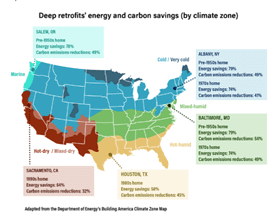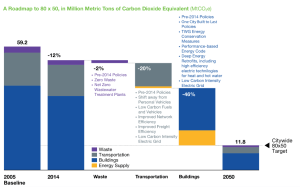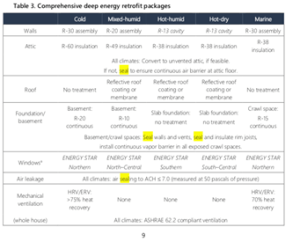 For those of us in the world of insulation, upgrading homes and buildings are always in fashion, but the push to do them seems to be gathering horsepower. With all the talk of aging power grids, carbon footprints, and reducing wasted energy, we are seeing a resurgence in the push for deep energy retrofits. And there is good reason for the push. You don’t have to look any farther than the American Council for an Energy Efficient Economy’s December 2021 Report.
For those of us in the world of insulation, upgrading homes and buildings are always in fashion, but the push to do them seems to be gathering horsepower. With all the talk of aging power grids, carbon footprints, and reducing wasted energy, we are seeing a resurgence in the push for deep energy retrofits. And there is good reason for the push. You don’t have to look any farther than the American Council for an Energy Efficient Economy’s December 2021 Report.
The report outlines results from five climate zones where the energy savings achieved ranged from 58-79% and carbon emissions reduced between 32-49%.
 One of the most surprising statements in the report dealt with the current policy goal to reach net zero by 2050 versus the reality of the amount of projects being done. Achieving this goal would require 2.5% of housing stock being retrofit each year. That’s about 25 times higher than the current rate. The lofty goal is causing agencies and policy makers to push for ways to at least double the rate that retrofits are being done before the year 2030. They feel that policies must be set now for the goal to be attainable. Add to this municipalities like New York City, who committed to reducing their footprint 80% by 2050, and you begin to see where we will likely be in the near future. In fact, when you look at New York’s plan, buildings and deep energy retrofits are the key to the whole thing because they make the largest impact on the goal.
One of the most surprising statements in the report dealt with the current policy goal to reach net zero by 2050 versus the reality of the amount of projects being done. Achieving this goal would require 2.5% of housing stock being retrofit each year. That’s about 25 times higher than the current rate. The lofty goal is causing agencies and policy makers to push for ways to at least double the rate that retrofits are being done before the year 2030. They feel that policies must be set now for the goal to be attainable. Add to this municipalities like New York City, who committed to reducing their footprint 80% by 2050, and you begin to see where we will likely be in the near future. In fact, when you look at New York’s plan, buildings and deep energy retrofits are the key to the whole thing because they make the largest impact on the goal.
 Another interesting take-a-way from the ACEEE report is table 3, which is all the things we as insulators already strive for. But it’s great to have them publishing recommendations for closed attic assemblies or ensuring a continuous air barrier at the attic floor. The same table recommends seven air changes per hour for existing homes. Some of these focus on heat pumps and electrification so much that you wonder if the programs they are designing will impact the envelope the way they should.
Another interesting take-a-way from the ACEEE report is table 3, which is all the things we as insulators already strive for. But it’s great to have them publishing recommendations for closed attic assemblies or ensuring a continuous air barrier at the attic floor. The same table recommends seven air changes per hour for existing homes. Some of these focus on heat pumps and electrification so much that you wonder if the programs they are designing will impact the envelope the way they should.
So, who’s going to pay for this? Reading the report, it sounds like most of the current push is for low income, equity-based programs. That said, there are many places where utilities and program funds are available to a wider group of homeowners. As an example, the Illinois Climate and Equitable Jobs Act (deep energy retrofit program) went into effect 1/1/22 and sets a requirement for electric utilities to achieve 21.5% energy reductions by 2030 based on 2012 levels. To achieve these goals, the legislation also requires utilities to establish an on-bill customer financing program for efficiency upgrades in homes and buildings.
There is also help from mortgages. While “Green” mortgages are not new, more and more lenders are becoming aware of them. There is a great article on helping your customers and builders find mortgages that incentivize better building envelopes. One thing to keep in mind is an Energy-Efficient Mortgage would be for new construction versus an Energy-Improvement Mortgage for retrofits.
Last year was the first conference where I watched the DOE talking about energy code enforcement on existing homes. The 2030 and 2050 goals have been out for years now, and three cities already require an energy audit when selling a home. Based on that, I would bet the closer we get to 2030, more pressure will be put on states and legislators to incentivize behavior, either by providing rebates or increasing the cost of fuels. Even if your state isn’t enacting policies today, 2022 might be the perfect time to get to know the right people at your utility providers and get involved locally so your company is the first to know.
Hopefully this information helps as you look toward the future of our industry. For more information on retrofit products, trainings, or any of the services we offer, reach out to your local branch or any of us here at IDI.